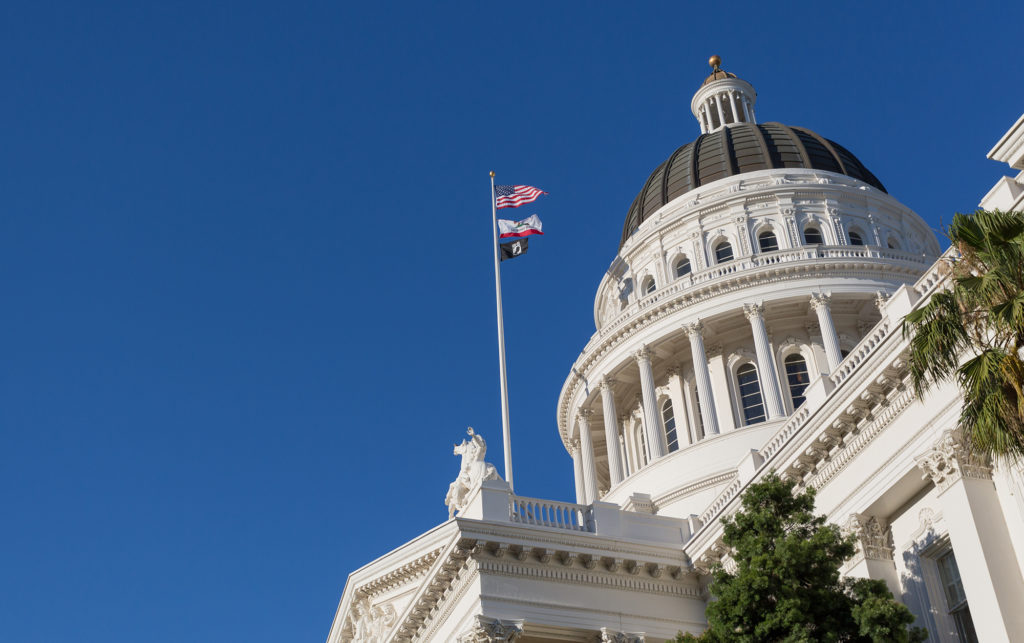Finance
California high schools will require personal finance course for graduation under new bill

Beginning with the graduating class of 2031, high school students in California will be required to complete one semester of a personal finance course before receiving their diplomas.
On Thursday, Gov. Gavin Newsom signed legislation to require personal finance education for high school graduates after the state Senate and Assembly passed Assembly Bill 2927. This makes California the 26th state to require finance-related instruction for graduating high school seniors.
The standalone course, which would teach students to expand their financial literacy through topics like minimizing bank fees and managing credit scores, would be offered early as the 2027-28 school year.
“Our young people need and deserve a clear understanding of personal finance so that they can make educated financial choices and build stable, successful futures for themselves and their future families,” State Superintendent Tony Thurmond said in a press release. “By adding personal finance to our high school graduation requirements, we acknowledge that managing household finances and building financial stability are essential life skills.”
Superintendent Thurmond, who sponsored the bill, said that “every child should have the opportunity to build these essential skills before navigating adult financial choices.” The content considered for the personal finance curriculum would also include budgeting principles, investment options and consumer protection awareness.
High schoolers may be able to substitute the new personal finance course for their semester-long economics course, which is currently required for graduation throughout the state. School districts and charter schools may also provide students the option to complete a yearlong course to further expand their financial literacy.
In order to enhance the creation of this curriculum, State Superintendent Thurmond announced efforts in March to build a personal finance task force that would support the implementation of these required courses for K-12 students throughout California.
Superintendent Thurmond and the California Department of Education plan to work with education experts from the Instructional Quality Commission to develop a curriculum guide and resources, expected to be adopted in 2026.

Finance
University of Phoenix and Goalsetter Launch Financial Wellness Webinar Series

Virtual, free series features Goalsetter’s award-winning curriculum along with guest speakers to support financial wellness
PHOENIX, November 04, 2024–(BUSINESS WIRE)–University of Phoenix is pleased to announce a new webinar series with Goalsetter, an award-winning financial education platform dedicated to helping individuals and families achieve financial wellness through engaging and practical resources. The ten-part series will launch with a discussion on “Managing Credit Card Debt and Fostering Good Credit Habits,” on Tuesday, November 19, at 12 p.m. MST. Featuring Tanya Van Court, Founder and CEO of Goalsetter, Kevin Soehner, Senior VP of Operations for iGrad®, and moderated by Chris Conway, Director of Financial Literacy at University of Phoenix, the discussion will focus on building good credit habits, understanding interest rates, and how credit can impact personal finance decisions. Throughout the series, participants will gain valuable insights and practical strategies to manage their finances and plan for a secure financial future, as well as have the opportunity to engage in a Q&A session during each webinar.
“At University of Phoenix, we are committed to equipping our students with the knowledge and tools necessary for financial success,” shares Director of Financial Literacy at the University, Chris Conway. “Our collaboration with Goalsetter aligns with our mission to empower students not only in their academic and career pursuits but also in their financial lives by helping them save time and money. This webinar series is designed to provide practical strategies and insights that can help learners make informed financial decisions.”
Each month during the series, University of Phoenix and Goalsetter will offer webinars focused on key strategies for financial wellness:
-
November: Managing Credit Card Debt and Fostering Good Credit Habits
-
December: Paying for School and Scholarships
-
January: The Art and Science of Effective Budgeting
-
February: Stop Overspending: 5 Tips
-
March: Yes! You Can Save Money: Little Actions that Add Up
-
April: Emergency Funds are Critical; How to Create Them, Even If You Think You Canʼt
-
May: Why Credit Scores are Important and How to Improve Them
-
June: How to Plan for Your Eventual Retirement
-
July: Investing in Your Families’ Future
-
August: How to Set Your Kids Up for Future Financial Success
“Our mission is to empower every individual with the financial knowledge they need to secure a strong financial future,” says Van Court. “By working with the University of Phoenix, we are bringing our award-winning financial education tools to a larger audience, helping individuals and families gain the practical skills to make informed financial choices. Together, we aim to create a pathway toward financial freedom that’s accessible, engaging, and transformative.”
Finance
Why banks are (probably) rooting for Donald Trump
US banks have a lot riding on the outcome of Election Day even if they’re not 100% sure how either candidate might treat their industry.
The “knee-jerk reaction,” according to KBW analyst Chris McGratty, is that a Donald Trump victory will mean a return to looser regulation of banks and more leniency in approving the sort of corporate mergers that produce big profits for Wall Street giants.
A Kamala Harris win, on the other hand, may mean that a more aggressive period of overseeing the nation’s largest financial institutions under President Joe Biden will continue.
“In my investor conversations, it definitely feels like people are pricing in Trump,” McGratty told Yahoo Finance. “So initially, if the election goes to Harris I would think banks would sell off,” he added.
The country’s largest lenders have had a great year thanks to the economy’s resilience during a period of elevated interest rates and a rebound in their investment banking and trading operations. The hope is next year could also turn out well, if lending and Wall Street dealmaking churn higher while interest rates fall.
An index tracking 24 of the largest domestically chartered US commercial banks (^BKX) is up 27% so far this year, outperforming the broader financial sector and major stock indexes.
Those other indexes for the financial sector (XLF), Nasdaq Composite (^IXIC), S&P 500 (^GSPC) are up 24%, 21% and 20%, respectively.
The consensus among industry observers is that a Trump White House might be more favorable for a run-up in financial stocks. After all, bank stocks rose 20% following the three months after Trump was elected in 2016.
But the challenge for bank executives as they assess the impact of a new president is that neither Trump or Harris have said much about how they want Washington to oversee the biggest banks in the US.
So instead their track records have largely spoken for them.
The Trump administration of last decade delivered a big corporate tax cut, and it also rolled back some big bank rules that were imposed in the aftermath of the 2008 financial crisis.
Harris, on the other hand, has touted her clash with big banks when she was California’s attorney general as an example of her willingness to take on powerful interests.
One big unknown is what either administration would do with a new set of controversial capital rules proposed by top bank regulators that would require lenders to set aside greater buffers for future losses.
The requirements are based on an international set of capital requirements known as Basel III imposed in the decade following the 2008 financial crisis.
Finance
Climate finance billions at stake at COP29

Rich nations will be under pressure at this month’s UN COP29 conference to substantially increase the amount of money they give to poorer countries for climate action.
But there is deep disagreement over how much is needed, who should pay and what should be covered, ensuring that “climate finance” will top the agenda at COP29 in Baku.
– What is climate finance? –
It is the buzzword in this year’s negotiations, which run from November 11 to 22, but there is not one agreed definition of climate finance.
In general terms, it is money spent in a manner “consistent with a pathway towards low greenhouse gas emissions and climate-resilient development”, as per phrasing used in the Paris Agreement.
That includes government or private money for clean energy like solar and wind, technology like electric vehicles, or adaptation measures like dykes to hold back rising seas.
But could a subsidy for a new water-efficient hotel, for example, be counted? It is not something the COP summits have addressed directly.
At the annual UN negotiations, climate finance has come to refer to the difficulties the developing world faces getting the money it needs to prepare for global warming.
– Who pays? –
Under a 1992 UN accord, a handful of rich countries most responsible for global warming were obligated to provide finance.
In 2009, the United States, the European Union, Japan, Britain, Canada, Switzerland, Norway, Iceland, New Zealand and Australia agreed to pay $100 billion per year by 2020.
They only achieved this for the first time in 2022. The delay eroded trust and fuelled accusations that rich countries were shirking their responsibility.
At COP29, nearly 200 nations are expected to agree on a new finance goal beyond 2025.
India has called for $1 trillion a year and some other proposals go higher, but countries on the hook want other major economies to chip in.
They argue times have changed and the big industrialised nations of the early 1990s represent just 30 percent of historic greenhouse gas emissions today.
In particular, there is a push for China — the world’s largest polluter today — and the oil-rich Gulf countries to pay. They do not accept this proposal.
– What’s being negotiated? –
Experts commissioned by the UN estimate that developing countries, excluding China, will need $2.4 trillion per year by 2030.
But the line between climate finance, foreign aid and private capital is often blurred and campaigners are pushing for clearer terms that specify where money comes from, and in what form.
In an October letter to governments, dozens of activist, environment and scientific groups called on rich nations to pay developing countries $1 trillion a year in three clear categories.
Some $300 billion would be government money for reducing planet-heating emissions, $300 billion for adaptation measures and $400 billion for disaster relief known as “loss and damage” funds.
The signatories said all the money should be grants, seeking to redress the provision of loans as climate finance that poorer countries say compounds their debt woes.
Developed countries do not want money for “loss and damage” included under any new climate finance pact reached at COP29.
– Where will they find the money? –
Today, most climate finance aid goes through development banks or funds co-managed with the countries concerned, such as the Green Climate Fund and the Global Environment Facility.
Campaigners are very critical of the $100 billion pledge because two-thirds of the money was given as loans, not grants.
Even revised upwards, it is likely any new pledge from governments will fall well short of what is needed.
But this commitment is viewed as highly symbolic nonetheless, and crucial to unlocking other sources of money, namely private capital.
Financial diplomacy also plays out at the World Bank, the International Monetary Fund and the G20, where this year’s host Brazil wants to craft a global tax on billionaires.
The idea of new global taxes, for example on aviation or maritime transport, is also supported by France, Kenya and Barbados, with the backing of UN chief Antonio Guterres.
Redirecting fossil fuel subsidies towards clean energy or wiping the debt of poor countries in exchange for climate investments are also among the options.
COP29 host Azerbaijan, meanwhile, has asked fossil fuel producers to contribute to a new fund that would channel money to developing countries.
bl-np/rlp/rsc
-

 Sports1 week ago
Sports1 week agoFreddie Freeman's walk-off grand slam gives Dodgers Game 1 World Series win vs. Yankees
-
News1 week ago
Sikh separatist, targeted once for assassination, says India still trying to kill him
-

 Culture1 week ago
Culture1 week agoFreddie Freeman wallops his way into World Series history with walk-off slam that’ll float forever
-

 Technology1 week ago
Technology1 week agoWhen a Facebook friend request turns into a hacker’s trap
-
Business3 days ago
Carol Lombardini, studio negotiator during Hollywood strikes, to step down
-

 Health4 days ago
Health4 days agoJust Walking Can Help You Lose Weight: Try These Simple Fat-Burning Tips!
-
Business2 days ago
Hall of Fame won't get Freddie Freeman's grand slam ball, but Dodgers donate World Series memorabilia
-

 Business7 days ago
Business7 days agoWill Newsom's expanded tax credit program save California's film industry?

















